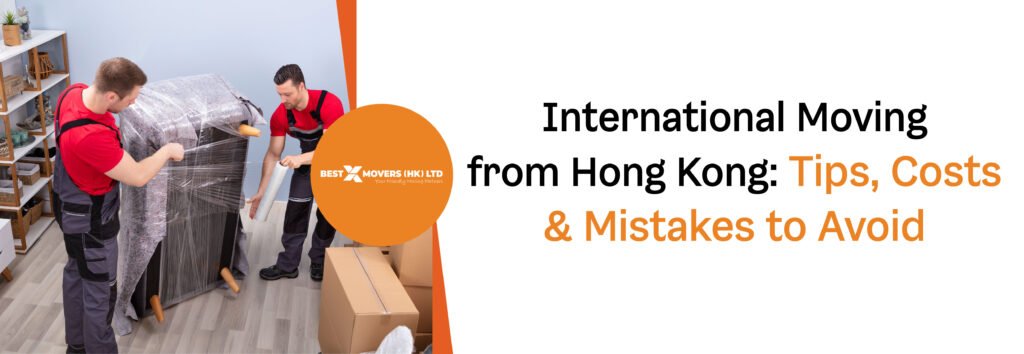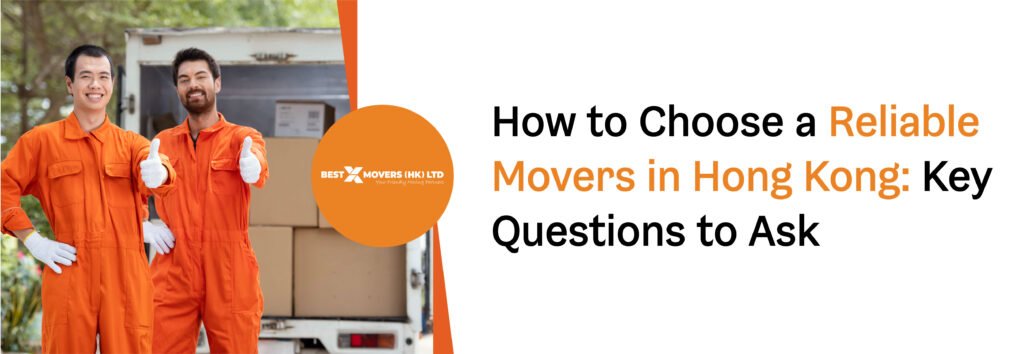International Moving from Hong Kong: Tips, Costs & Mistakes to Avoid
Introduction Moving internationally from Hong Kong can feel overwhelming, especially when you’re dealing with complex paperwork, shipping regulations, and the emotional stress of leaving home. Whether you’re relocating for work, family reasons, or seeking new opportunities, proper planning makes all the difference between a smooth transition and a stressful experience. Hong Kong’s unique position as an international hub means residents often have experience with global connections, but moving your entire life overseas requires careful attention to details you might not have considered before. From understanding shipping costs to navigating customs requirements, every aspect of your international move needs thoughtful preparation. Why People Are Moving from Hong Kong Internationally ? The reasons behind international moving from Hong Kong vary widely among residents. Many professionals receive job offers in other countries, while others seek educational opportunities or want to reunite with family members abroad. Recent years have seen increased interest in relocating for lifestyle changes, whether that means slower-paced living in rural areas or access to different healthcare systems. Some families choose to move for their children’s education, seeking specific school systems or university pathways not available locally. Others are drawn to countries with different climates, housing markets, or retirement benefits. Whatever your reasons, understanding your motivations helps shape your moving strategy and destination choice. Economic factors also play a role in relocation decisions. Different countries offer varying costs of living, tax structures, and career opportunities. Some people find better work-life balance elsewhere, while others are attracted to entrepreneurial environments or specific industries that thrive in certain locations. Planning Your International Move from Hong Kong Start planning your international move at least 3-6 months before your intended departure date. This timeline gives you enough space to handle visa applications, find housing, arrange shipping, and complete other essential tasks without rushing. Create a detailed moving checklist that includes both administrative tasks and practical preparations. Your list should cover visa and immigration paperwork, medical records transfer, school enrollment for children, pet relocation if applicable, and financial account transfers. Research your destination country’s requirements thoroughly. Different countries have specific rules about what items you can bring, quarantine periods for pets, professional license transfers, and tax obligations. Some countries require proof of funds, health certificates, or sponsor letters as part of the immigration process. Consider visiting your destination before the move if possible. This trip helps you understand the local housing market, school options, and general lifestyle. You can also open bank accounts, meet with potential employers, or establish connections that make your transition smoother. Creating Your Moving Budget International moving costs vary significantly based on your destination, shipping volume, and timeline preferences. Start by getting quotes from multiple moving companies to understand the baseline expenses for your situation. Your budget should include shipping costs, visa and legal fees, temporary accommodation, travel expenses, insurance, and an emergency fund for unexpected costs. Many people underestimate the total expenses involved in international relocation, so add at least 20% buffer to your initial estimates. Don’t forget to account for costs in your new country, including security deposits for housing, vehicle purchases or rentals, new furniture or appliances, and setup fees for utilities and services. Understanding Moving Costs International moving from Hong Kong involves several cost components that vary based on your specific situation. Shipping represents the largest expense for most families, with costs determined by volume, weight, destination, and shipping method. Sea freight costs significantly less than air freight but takes much longer to arrive. A typical 20-foot container from Hong Kong to North America costs between $3,000-$6,000, while the same container to Australia might cost $2,500-$4,500. European destinations usually fall somewhere in the middle range. Air freight costs approximately 5-10 times more than sea freight but delivers your belongings within 1-2 weeks instead of 4-8 weeks. Most families use air freight only for essential items and send everything else by sea. Additional Costs to Consider Beyond basic shipping, you’ll pay for packing services, insurance, customs clearance, and delivery to your new home. Professional packing typically costs $500-$1,500 depending on your home size and the complexity of items being packed. Insurance protects your belongings during transit and costs around 1-2% of the declared value. While this might seem expensive, replacing damaged or lost items in your new country often costs much more than the insurance premium. Customs duties and taxes vary by destination country and the types of items you’re importing. Some countries allow duty-free import of personal belongings if you meet specific residency requirements, while others charge significant fees regardless of your situation. Storage costs apply if your belongings arrive before you’re ready to receive them or if you need temporary storage while finding permanent housing. Best Movers HK can help you understand these various cost components and plan accordingly. Choosing the Right Moving Company Selecting the right moving company makes or breaks your international relocation experience. Look for companies with specific experience in international moves from Hong Kong, proper licensing, and positive customer reviews from people who moved to your destination country. Check that your chosen company holds appropriate certifications and insurance coverage. International movers should be members of professional organizations like FIDI or IAM, which maintain quality standards and provide dispute resolution services if problems arise. Get detailed written quotes from at least three companies, making sure each quote covers the same services and conditions. Beware of quotes that seem unusually low, as these often come with hidden fees or reduced service quality that creates problems later. Ask about the company’s partnerships in your destination country. Established movers work with reliable agents worldwide who handle customs clearance and final delivery. This network approach typically provides smoother service than companies trying to manage everything from Hong Kong. Questions to Ask Potential Movers When interviewing moving companies, ask about their experience with your specific destination, average transit times, insurance coverage options, and what happens if delays occur. Find out whether they handle customs clearance or if you need separate arrangements. Ask for references from customers who recently


